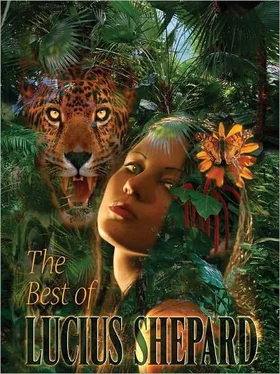“This is a black jaguar,” she said. “Surely you know they are not ordinary animals, that they have purposes with which we must not interfere?”
Esteban was startled to hear his father’s words from her mouth, but he dismissed it as coincidence and replied, “Perhaps. But they are not mine.”
“Truly, they are,” she said. “You have simply chosen to ignore them.” She scooped up another handful of sand. “How will you do it? You have no gun. Only a machete.”
“I have this as well,” he said, and from his sack he pulled out a small parcel of herbs and handed it to her.
She opened it and sniffed the contents. “Herbs? Ah! You plan to drug the jaguar.”
“Not the jaguar. Myself.” He took back the parcel. “The herbs slow the heart and give the body a semblance of death. They induce a trance, but one that can be thrown off at a moment’s notice. After I chew them, I will lie down in a place that the jaguar must pass on its nightly hunt. It will think I am dead, but it will not feed unless it is sure that the spirit has left the flesh, and to determine this, it will sit on the body so it can feel the spirit rise up. As soon as it starts to settle, I will throw off the trance and stab it between the ribs. If my hand is steady, it will die instantly.”
“And if your hand is unsteady?”
“I have killed nearly fifty jaguars,” he said. “I no longer fear unsteadiness. The method comes down through my family from the Old Patuca, and it has never failed, to my knowledge.”
“But a black jaguar…”
“Black or spotted, it makes no difference. Jaguars are creatures of instinct, and one is like another when it comes to feeding.”
“Well,” she said, “I cannot wish you luck, but neither do I wish you ill.”
She came to her feet, brushing the sand from her dress.
He wanted to ask her to stay, but pride prevented him, and she laughed as if she knew his mind.
“Perhaps we will talk again, Esteban,” she said. “It would be a pity if we did not, for more lies between us than we have spoken of this day.”
She walked swiftly down the beach, becoming a diminutive black figure that was rippled away by the heat haze.
That evening, needing a place from which to keep watch, Esteban pried open the screen door of one of the houses facing the beach and went onto the porch. Chameleons skittered into the corners, and an iguana slithered off a rusted lawn chair sheathed in spiderweb and vanished through a gap in the floor. The interior of the house was dark and forbidding, except for the bathroom, the roof of which was missing, webbed over by vines that admitted a gray-green infusion of twilight. The cracked toilet was full of rainwater and dead insects. Uneasy, Esteban returned to the porch, cleaned the lawn chair, and sat.
Out on the horizon the sea and sky were blending in a haze of silver and gray; the wind had died, and the palms were as still as sculpture; a string of pelicans flying low above the waves seemed to be spelling a sentence of cryptic black syllables. But the eerie beauty of the scene was lost on him. He could not stop thinking of the woman. The memory of her hips rolling beneath the fabric of her dress as she walked away was repeated over and over in his thoughts, and whenever he tried to turn his attention to the matter at hand, the memory became more compelling. He imagined her naked, the play of muscles rippling her haunches, and this so enflamed him that he started to pace, unmindful of the fact that the creaking boards were signaling his presence. He could not understand her effect upon him. Perhaps, he thought, it was her defense of the jaguar, her calling to mind of all he was putting behind him… and then a realization settled over him like an icy shroud.
It was commonly held among the Patuca that a man about to suffer a solitary and unexpected death would be visited by an envoy of death, who—standing in for family and friends—would prepare him to face the event; and Esteban was now very sure that the woman had been such an envoy, that her allure had been specifically designed to attract his soul to its imminent fate. He sat back down in the lawn chair, numb with the realization. Her knowledge of his father’s words, the odd flavor of her conversation, her intimation that more lay between them: It all accorded perfectly with the traditional wisdom. The moon rose three-quarters full, silvering the sands of the barrio, and still he sat there, rooted to the spot by his fear of death.
He had been watching the jaguar for several seconds before he registered its presence. It seemed at first that a scrap of night sky had fallen onto the sand and was being blown by a fitful breeze; but soon he saw that it was the jaguar, that it was inching along as if stalking some prey. Then it leaped high into the air, twisting and turning, and began to race up and down the beach: a ribbon of black water flowing across the silver sands. He had never before seen a jaguar at play, and this alone was cause for wonder; but most of all, he wondered at the fact that here were his childhood dreams come to life. He might have been peering out onto a silvery meadow of the moon, spying on one of its magical creatures. His fear was eroded by the sight, and like a child he pressed his nose to the screen, trying not to blink, anxious that he might miss a single moment.
At length the jaguar left off its play and came prowling up the beach toward the jungle. By the set of its ears and the purposeful sway of its walk, Esteban recognized that it was hunting. It stopped beneath a palm about twenty feet from the house, lifted its head, and tested the air.
Moonlight frayed down through the fronds, applying liquid gleams to its haunches; its eyes, glinting yellow-green, were like peepholes into a lurid dimension of fire. The jaguar’s beauty was heart-stopping—the embodiment of a flawless principle—and Esteban, contrasting this beauty with the pallid ugliness of his employer, with the ugly principle that had led to his hiring, doubted that he could ever bring himself to kill it.
All the following day he debated the question. He had hoped the woman would return, because he had rejected the idea that she was death’s envoy—that perception, he thought, must have been induced by the mysterious atmosphere of the barrio—and he felt that if she was to argue the jaguar’s cause again, he would let himself be persuaded. But she did not put in an appearance, and as he sat upon the beach, watching the evening sun decline through strata of dusky orange and lavender clouds, casting wild glitters over the sea, he understood once more that he had no choice.
Whether or not the jaguar was beautiful, whether or not the woman had been on a supernatural errand, he must treat these things as if they had no substance. The point of the hunt had been to deny mysteries of this sort, and he had lost sight of it under the influence of old dreams.
He waited until moonrise to take the herbs, and then lay down beneath the palm tree where the jaguar had paused the previous night. Lizards whispered past in the grasses, sand fleas hopped onto his face; he hardly felt them, sinking deeper into the languor of the herbs. The fronds overhead showed an ashen green in the moonlight, lifting, rustling; and the stars between their feathered edges flickered crazily as if the breeze were fanning their flames. He became immersed in the landscape, savoring the smells of brine and rotting foliage that were blowing across the beach, drifting with them; but when he heard the pad of the jaguar’s step, he came alert. Through narrowed eyes he saw it sitting a dozen feet away, a bulky shadow craning its neck toward him, investigating his scent. After a moment it began to circle him, each circle a bit tighter than the one before, and whenever it passed out of view he had to repress a trickle of fear. Then, as it passed close on the seaward side, he caught a whiff of its odor.
Читать дальше






